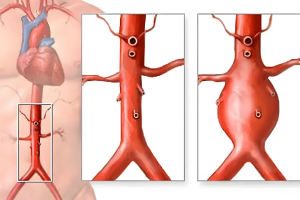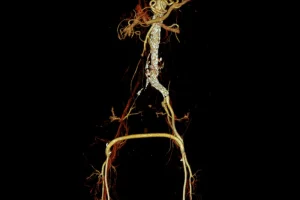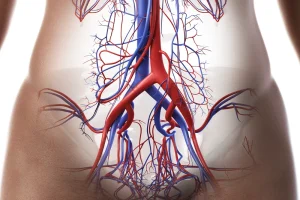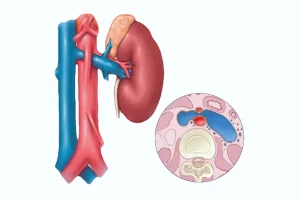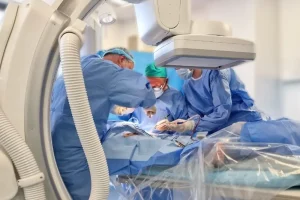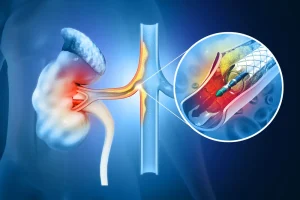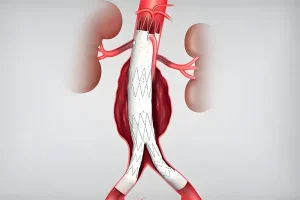Cardiology and Interventional Radiology
Advanced care for your heart and blood vessels
Home » Cardiology and Interventional Radiology
Conditions Treated
Cardiovascular Conditions
- Thoracic and abdominal aortic aneurysm
- Arterial thrombosis and stenosis
Complex Vascular Diseases
- Aortic dilatation and other aortic pathologies
- Stenosis of mesenteric and renal arteries
- Arterial and venous obstructions
Medical Procedures
Interventional Cardiology
Interventional Radiology
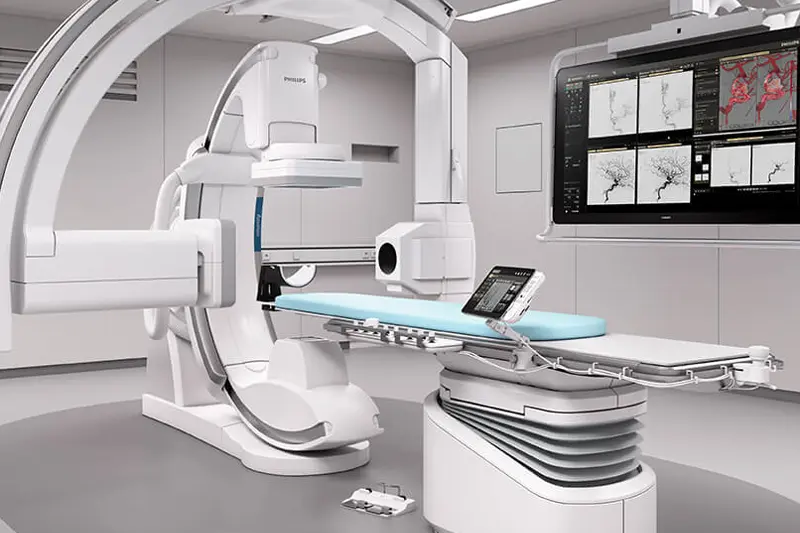
Living with heart or vascular problems can quietly steal your energy, mobility, and peace of mind. Simple activities become exhausting. If left untreated, symptoms can worsen and increase your risk of life-threatening complications.
You deserve more than just short-term relief. Our interventional cardiology and interventional radiology treatments combine advanced imaging technologies with minimally invasive techniques to accurately diagnose and treat conditions related to the heart, lungs, blood vessels, and other organs.
Taking a collaborative approach to provide comprehensive care, our specialists treat diseases at the source, reaching areas that would otherwise be difficult or impossible to reach by traditional surgical methods. Considered some of the most advanced medical treatments available today, our treatments help you take back control of your heart health and your life.
Conditions Treated
Using cutting-edge, minimally invasive procedures, we address a wide range of heart and vascular conditions, such as:
Cardiovascular Conditions
- Peripheral arterial ischemia: Reduced blood flow to your limbs, often causing pain and mobility issues;
- Peripheral arterial disease: Narrowed arteries that reduce circulation to your extremities;
- Thoracic and abdominal aortic aneurysm: Bulging or weakened sections of the aorta that can be life-threatening if untreated;
- Arterial thrombosis and stenosis: Blood clots or narrowed arteries that can limit blood supply to critical areas.
Complex Vascular Diseases
- Aortic dilatation and other aortic pathologies: Abnormal enlargement or damage to the main artery of the body;
- Stenosis of mesenteric and renal arteries: Narrowing of arteries that supply the intestines and kidneys;
- Arterial and venous obstructions: Blockages in the blood vessels that disrupt normal circulation.
What Is Interventional Cardiology?
Interventional cardiology is a subspecialty that diagnoses and treats cardiovascular conditions like coronary artery disease, heart valve disorders, and certain types of peripheral arterial disease without the need for open-heart surgery.
Using advanced medical imaging and specialized equipment, interventional cardiology procedures may be performed via catheterization. This approach allows physicians to reach affected areas and treat blockages through less invasive, precise techniques.
These cardiology treatments aim to restore blood circulation and normal function to organs that may have been damaged, facilitating faster recovery and a greatly improved quality of life following treatment.
Interventional Cardiology Procedures
- Aortic stent graft implantation: Reinforces weakened areas of the aorta to prevent rupture;
- Peripheral artery angioplasty: Opens narrowed arteries in the limbs to improve blood flow;
- Renal artery angioplasty: Restores circulation to the kidneys in cases of narrowing or blockage;
- Angioplasty and stenting for arterial ischemia: Treats restricted blood flow in arteries by widening the vessel and placing a stent to keep it open.
What Is Interventional Radiology?
Interventional radiology offers minimally invasive, image-guided procedures to diagnose and treat various medical conditions, particularly vascular problems like peripheral arterial disease.
By employing advanced imaging techniques like ultrasound or CT scans, specialists guide devices such as stents, stent grafts, balloons, and catheters into narrowed or blocked peripheral arteries. Another common procedure is embolization, which involves deliberately blocking abnormal blood vessels to prevent complications or to cut off blood supply to tumors.
An effective alternative to traditional surgery, these targeted therapies can help manage vascular issues with less discomfort and lower risk.
Interventional Radiology Procedures
- Aortic aneurysm or dilated aorta treatment: Minimally invasive repair of weakened sections of the aorta;
- Vascular embolization: Blocks abnormal blood vessels that may cause bleeding or dysfunction;
- Mesenteric artery angiography and angioplasty: Diagnoses and treats narrowing of the arteries supplying the intestines;
- Venous angioplasty: Opens up blocked or narrowed veins to improve blood return to the heart, ideal for complex obstructions.
Advantages of Minimally Invasive Treatments
Undergoing an interventional radiology or cardiology procedure offers several important benefits, such as:
- Low risk. Less trauma to the body and fewer complications compared to open surgery.
- Short recovery time. You can quickly return to daily activities.
- Accurate results. Real-time imaging ensures that you get a precise diagnosis and treatment.
- Less discomfort. Procedures result in minimized pain, no large incisions, and little to no scarring.
Benefits of Minimally Invasive Treatments
Undergoing an interventional radiology or cardiology procedure offers several important benefits, such as:
- Low risk: Less trauma to the body and fewer complications compared to open surgery;
- Short recovery time: You can quickly return to daily activities;
- Accurate results: Real-time imaging ensures that you get a precise diagnosis and treatment;
- Less discomfort: Procedures result in minimized pain, no large incisions, and little to no scarring.
Advanced Technologies and Precision Diagnostics
VenArt Clinic stands out for its use of next-generation equipment to deliver safe, efficient, and highly accurate care:
- Angiography: Detailed visualization of arteries and veins used to detect blockages or abnormalities;
- Angioplasty: Dilating narrowed arteries or veins with balloons and stents;
- Stent grafts: Specially designed tools used to reinforce weakened arteries and prevent rupture;
- Embolization: Blocking of abnormal blood vessels to treat dysfunction or bleeding;
- Advanced catheters: Highly targeted treatment with minimal trauma to the body.
Why Choose VenArt Clinic?
At VenArt Clinic, your well-being comes first. Here’s why patients from around the world choose us:
- Top medical specialists: Our doctors are internationally trained and highly experienced in treating vascular diseases;
- Cutting-edge technology: We use the latest imaging and treatment tools for maximum precision;
- Personalized care: Every treatment plan is tailored to your specific needs and health goals;
- Minimally invasive approach: We specialize in procedures that enable you to enjoy a faster recovery, less discomfort, and better long-term outcomes.
Reclaim your life from the limits of heart and vascular disease. Contact our team today.
Our Medical Team
Meet the accomplished specialist leading VenArt’s Clinic highly sought-after interventional radiology and cardiology procedures.
- Cătălina Riebel: A senior cardiologist with international training and expertise in interventional cardiology, pediatric cardiology, and advanced cardiovascular imaging. Dr. Riebel specializes in the diagnosis and minimally invasive treatment of heart, arterial, venous, and cerebrovascular conditions in both adults and children.
Frequently Asked Questions
What are the most common heart diseases?
The most common heart conditions include:
- Coronary artery disease (narrowing of the coronary arteries);
- Heart failure (inability of the heart to pump blood efficiently);
- Arrhythmias (heart rhythm disturbances);
- Hypertension (high blood pressure);
- Valve disease (damage to the heart valves).
What is a heart attack, and what are its symptoms?
A heart attack, or myocardial infarction, occurs when blood flow to a part of the heart is blocked, resulting in damage to the heart muscle. Symptoms include severe chest pain, which may radiate to the left arm, neck, or jaw.
What symptoms should prompt a cardiology appointment?
You should consult a cardiologist if you experience:
- Chest pain or discomfort;
- Palpitations or irregular heartbeat;
- Shortness of breath, especially during physical activity;
- Dizziness or fainting;
- Excessive tiredness for no apparent reason;
- Swelling in the legs, ankles, or abdome
What risk factors contribute to cardiovascular disease?
The main risk factors include:
- Smoking;
- High blood pressure;
- High cholesterol;
- Diabetes;
- Obesity;
- Physical inactivity;
- Family history of heart disease;
- Excessive stres.
What is cholesterol, and how does it affect the heart?
Cholesterol is an essential fatty substance for the body, but high levels can lead to deposits building up on artery walls, narrowing them and increasing the risk of coronary heart disease and heart attack.
How often should I have my heart checked?
The frequency of check-ups depends on your age, risk factors, and medical history. People over 40 years old or with risk factors should have an annual check-up. The cardiologist will establish an appropriate program for each patient.

